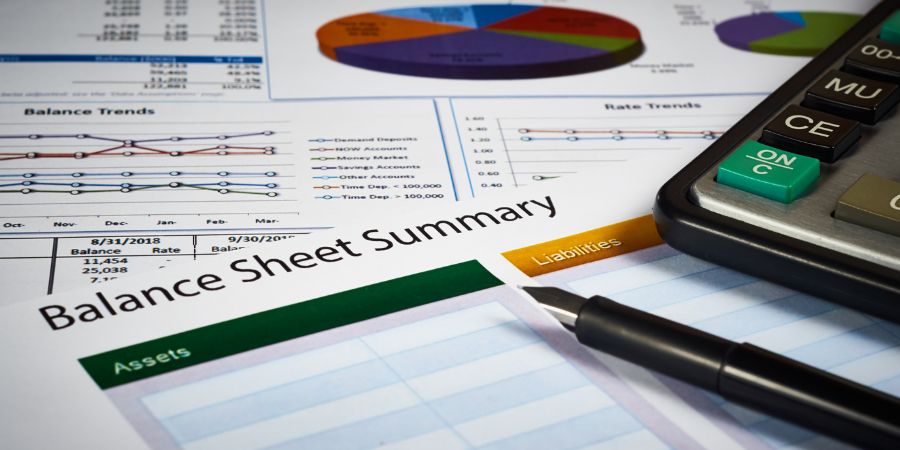[et_pb_section fb_built=”1″ _builder_version=”4.16″ global_colors_info=”{}”][et_pb_row _builder_version=”4.16″ background_size=”initial” background_position=”top_left” background_repeat=”repeat” global_colors_info=”{}”][et_pb_column type=”4_4″ _builder_version=”4.16″ custom_padding=”|||” global_colors_info=”{}” custom_padding__hover=”|||”][et_pb_text _builder_version=”4.18.0″ background_size=”initial” background_position=”top_left” background_repeat=”repeat” global_colors_info=”{}”]
Have you ever wondered why it’s important to reconcile your balance sheet regularly? Doing so is essential to ensure the accuracy of your financial records. Still, it can also help reveal any discrepancies that might be costing you money.
At Protea Financial, we understand the importance of accurate financial records. We’re here to explain why reconciling your balance sheet regularly is vital for avoiding costly mistakes. Read on to learn more about how to keep track of your finances with our simple yet effective tips.
The Importance of Reconciling Your Balance Sheet
The balance sheet is one of any business’s most important financial statements. It provides a glimpse of the company’s assets and liabilities, plus the equity, at a specific time. This information is critical for making sound business decisions and managing financial risks.
A reconciled balance sheet ensures that the figures on the statement are accurate and up-to-date. This process involves comparing the balance sheet to other financial records, such as bank statements and invoices, to identify and correct any discrepancies. Reconciling your balance sheet regularly helps prevent errors and ensures you have an accurate picture of your company’s finances.
There are several reasons why it’s important to reconcile your balance sheet regularly:
- To prevent errors: reconciliation catches errors and discrepancies so they can be corrected. This helps to ensure that the balance sheet is accurate and up-to-date.
- To manage financial risks: by identifying errors and discrepancies, reconciliation can help you to manage financial risks more effectively.
- To make sound business decisions: having an accurate balance sheet is essential for making informed business decisions about investment opportunities, financing options, and strategic planning.
- To comply with accounting standards: many accounting standards require businesses to reconcile their balance sheets regularly. This helps to ensure that financial statements are prepared in accordance with generally accepted accounting principles (GAAP).
Basics on How to Reconcile Your Balance Sheet
Reconciling your balance sheet should be a breeze if you keep your business finances in order. Here’s how to do it:
- Check 3rd party records against the balance sheet. Make sure that all the account balances on the balance sheet match these records.
- Adjust any discrepancies. Make the necessary adjustments if there are any differences between the records and the balance sheet.
- Verify that the changes are reflected on the balance sheet. Once you’ve made all the necessary adjustments, check to ensure they’re reflected on the balance sheet.
- Review and sign off on the reconciliation. Once you’re satisfied that everything is in order, review and sign off on the reconciliation so that it can be filed away for future reference.
The Benefits of Reconciling Your Balance Sheet
Reconciling your balance sheet regularly has numerous benefits. Perhaps most importantly, it ensures the accuracy of your financial statements. This, in turn, gives you a more accurate picture of your business’s financial health and can help you make better decisions about where to allocate resources.
In addition, reconciling your balance sheet can help you catch errors and prevent fraud. For example, there are discrepancies between your records and those of your bank or creditors. In that case, reconciling will help you identify and correct them, saving you time and money in the long run.
Finally, reconciling your balance sheet can help improve your business’s cash flow. By regularly comparing your records to those of your bank or creditors, you can identify and address any late payments or other issues causing cash flow problems. This can free up funds for other purposes, such as investing in new equipment or hiring additional staff.
How Does Reconciliation of Balance Sheets Help Spot Inconsistencies?
There are several types of inconsistencies that the reconciliation of balance sheets can help identify:
- Different account balances: If the accounts receivable balance on the company’s books doesn’t match the corresponding balance on the customer’s books, it could indicate unrecorded sales or incorrect customer payments.
- Different classifications of assets and liabilities: If the way assets and liabilities are classified on the company’s books doesn’t match the way they’re classified on the customer’s books, it could indicate that there are misclassified items.
- Incorrectly recorded transactions: If any transactions were incorrectly recorded on either the company’s or the customer’s books, it would lead to discrepancies between the two books.
Balance Sheet Reconciliation Can Prevent Embezzlement and Fraud
While many organizations have some form of balance sheet reconciliation process, it needs to be given the attention it deserves. By taking a closer look at your balance sheet reconciliations and implementing some best practices, you can help prevent embezzlement and fraud.
One of the most important aspects of any reconciliation is ensuring that all transactions are appropriately accounted for. This means reviewing each transaction to ensure it is correctly recorded in the accounting system. If there are any discrepancies, they should be investigated and corrected immediately.
Another important aspect of reconciliation is ensuring that all balances agree. This means comparing the balances on the accounting records to the balances on the bank statements or other supporting documentation. If there are any differences, they should be investigated and resolved.
Finally, it is essential to review reconciliations regularly to ensure that they are performed promptly and accurately. Suppose there are any problems with the reconciliation process. In that case, they should be addressed as soon as possible while also fixing the process itself to avoid the issues on future reconciliations. Taking these steps can help prevent embezzlement and fraud within your organization.
How Often Should You Reconcile Your Balance Sheet?
It’s important to reconcile your balance sheet regularly to ensure that your books are accurate and up-to-date. Depending on the size and complexity of your business, you may need to reconcile your balance sheet monthly, quarterly, or even annually.
If you have a small business with simple financials, reconciliation may only take a few minutes each month. But suppose you have a large business with multiple bank accounts, credit cards, and loans. In that case, reconciliation can be a more involved process.
No matter how often you reconcile your balance sheet, the goal is always the same: to ensure that your assets and liabilities match up with your financial institution’s records. This ensures that your books are accurate and up-to-date, which is crucial for making sound business decisions.
Turn to Protea Financial for Assistance Reconciling Your Balance Sheets
Reconciling your balance sheet regularly can help you maintain an accurate financial information record and ensure that all transactions are accounted for appropriately. It also allows businesses to spot discrepancies in their accounts or identify fraudulent activity quickly. Regular reconciliation helps improve the accuracy of financial data and boosts business efficiency and profitability over time. For help reconciling your balance sheets, please get in touch with Protea Financial right away!
[/et_pb_text][et_pb_cta title=”Protea Financial Can Help You Reconcile Your Balance Sheets and More!” button_url=”https://proteafinancial.com/contact/” url_new_window=”on” button_text=”Call Protea Financial Right Away!” _builder_version=”4.18.0″ _module_preset=”default” body_font_size=”16px” background_color=”#000000″ global_colors_info=”{}”]
For help when it comes time to reconcile your balance sheets, contact the experienced professionals of Protea Financial. We are here to help!
[/et_pb_cta][/et_pb_column][/et_pb_row][/et_pb_section]


